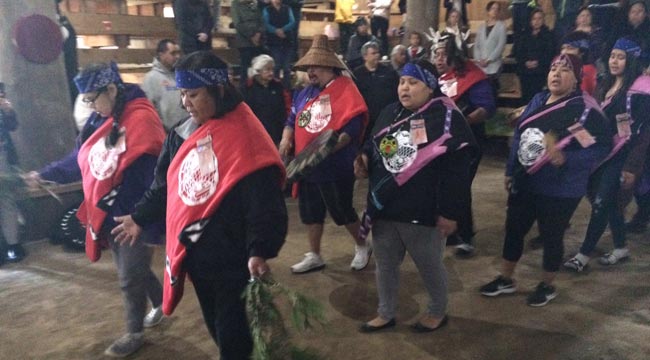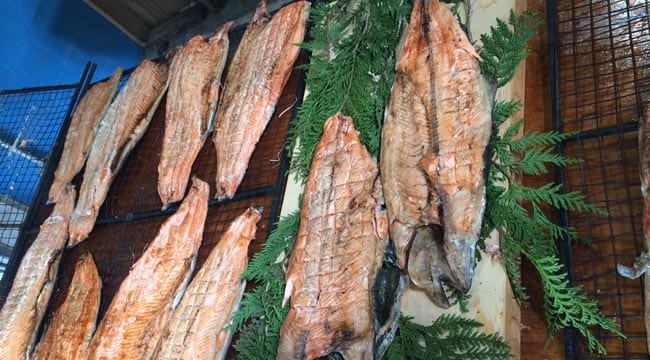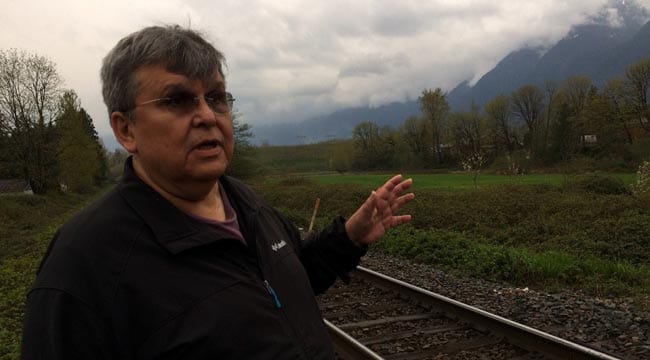When they’re done feasting on the first salmon catch of the year, members of Cheam First Nation collect the bones and throw them back in the river. It’s to ensure the fish will return next season.
Though the local delicacy comes from waters that run along the existing Trans Mountain pipeline near Chilliwack, B.C., there was no talk of politics on this sunny afternoon during the community’s annual salmon ceremony. A group from the Sto:lo Nation sang as they paraded the freshly caught salmon that had been smoked and laid on cedar boughs.

Before taking their first bites, everyone paused for a moment of prayer.
The members were here for the sacred gathering, not to be divided by the most contentious infrastructure project in the country.
Kinder Morgan’s planned $7.4-billion pipeline expansion has raised concerns about the impact on Pacific salmon streams.
But Cheam First Nation Chief Ernie Crey is confident everything will be done to protect his community’s precious supply.
“Salmon-bearing streams, we told them, would need to be afforded maximum protection,” he said.

Cheam First Nation is one of 43 First Nation communities that have signed mutual benefit agreements with the Texas-based Kinder Morgan to build the pipeline.
The community is set to receive millions in cash if the pipeline is built. Crey said the band signed a non-disclosure agreement and he would not divulge the terms of the deal.
He toured APTN around the small mountainside reserve, pointing out the band’s administration building, another space for ceremonies and gatherings and the railways that cut through the community. With a neon security truck nearby, Crey said he didn’t think community members would feel comfortable with a camera rolling past their homes.
Prime Minister Justin Trudeau has said the pipeline is in the “national interest,” but Crey’s focus is on his community – the jobs he said the pipeline will create, the employable skills it will provide Cheam First Nation members and the cash flow from the deal that can be reinvested elsewhere.
“We want to use our agreement with Kinder Morgan as a springboard to other economic development,” he said.

But with mounting opposition to the pipeline – including several legal challenges from First Nation communities and the cities of Burnaby and Vancouver – the company has threatened to back out if a deal is not reached by May 31.
Trudeau and Alberta Premier Rachel Notley have said they are willing to invest in the pipeline to keep it alive. Crey said he would do the same with the support of his community and band councillors.
Cheam First Nation member Iyeselwet, also known by her borrowed name Edna Denise Douglas, said the benefits of the Kinder Morgan agreement do not equal the potential harms.
“We’re losing the spirit of our people. We lost the spirit of our people to capitalism,” she said, adding that Crey alone “does not represent” the community’s values.
“I don’t see an infinite future for fossil fuels and digging it up out of the earth. As a matter of fact, digging things out of the earth defies our cultural principles.”
On any day in Cheam First Nation, trains can be heard barreling through the community every 30 minutes, blaring their horns. Crey said you can pinpoint which cars are carrying diluted bitumen from Edmonton to Burnaby, B.C., nearly 100 kilometres west of Cheam.
He would rather see a pipe than trains.
“That’s a more dangerous way to move this product than in a contemporary, up-to-date, second-to-none pipeline.”











Although i dont fully agree with signing an MOU with Kinder Morgan, I do believe that it is going to get to our coast one way or another and I would prefer the pipeline rather than having it shipped through our communities trains and trucks. Train derailments occur frequently and I do not wish to think about how much damage could occur if there were a derailment in either the Thompson or Fraser River watershed.
Although i dont fully agree with signing an MOU with Kinder Morgan, I do believe that it is going to get to our coast one way or another and I would prefer the pipeline rather than having it shipped through our communities trains and trucks. Train derailments occur frequently and I do not wish to think about how much damage could occur if there were a derailment in either the Thompson or Fraser River watershed.